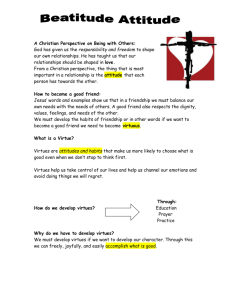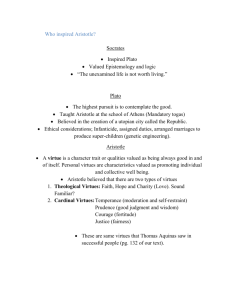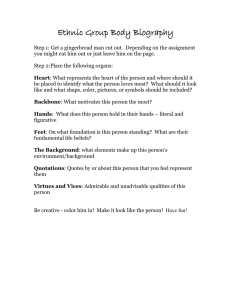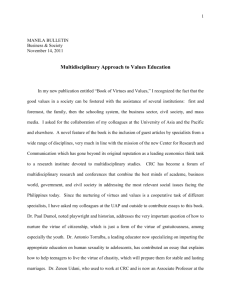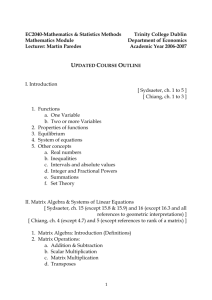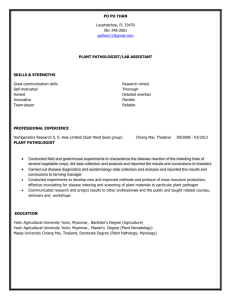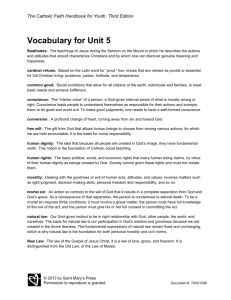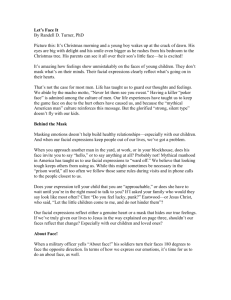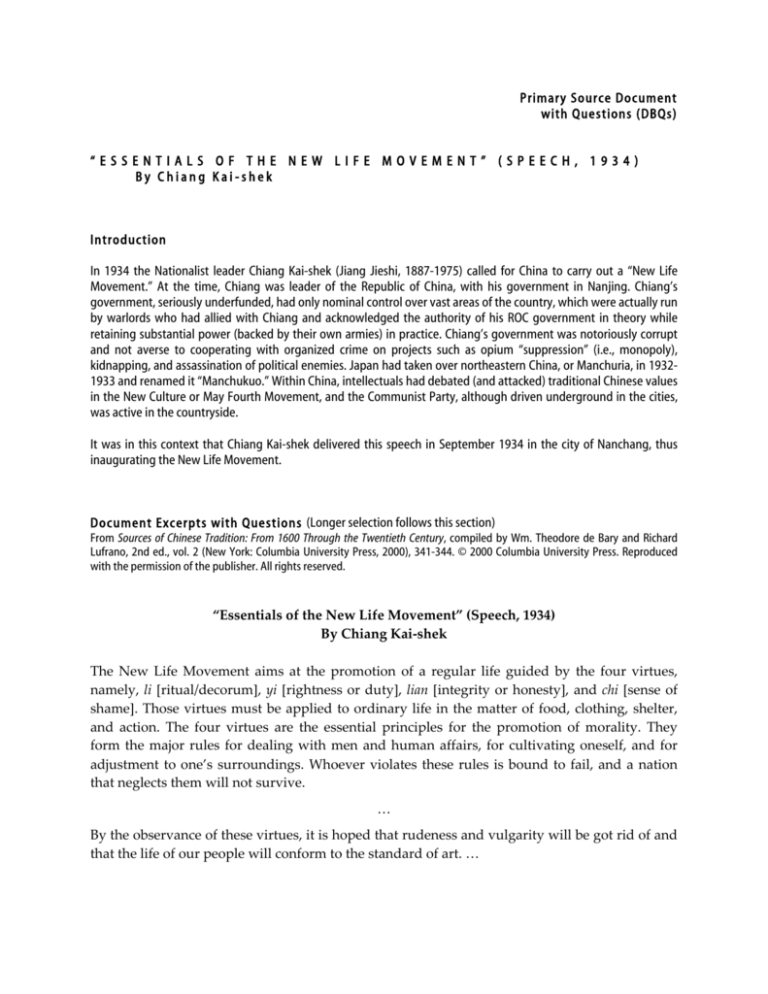
Primary Source Document
with Questions (DBQs)
“ESSENTIALS OF THE NEW LIFE MOVEMENT” (SPEECH, 1934)
By Chiang Kai-shek
Introduction
In 1934 the Nationalist leader Chiang Kai-shek (Jiang Jieshi, 1887-1975) called for China to carry out a “New Life
Movement.” At the time, Chiang was leader of the Republic of China, with his government in Nanjing. Chiang’s
government, seriously underfunded, had only nominal control over vast areas of the country, which were actually run
by warlords who had allied with Chiang and acknowledged the authority of his ROC government in theory while
retaining substantial power (backed by their own armies) in practice. Chiang’s government was notoriously corrupt
and not averse to cooperating with organized crime on projects such as opium “suppression” (i.e., monopoly),
kidnapping, and assassination of political enemies. Japan had taken over northeastern China, or Manchuria, in 19321933 and renamed it “Manchukuo.” Within China, intellectuals had debated (and attacked) traditional Chinese values
in the New Culture or May Fourth Movement, and the Communist Party, although driven underground in the cities,
was active in the countryside.
It was in this context that Chiang Kai-shek delivered this speech in September 1934 in the city of Nanchang, thus
inaugurating the New Life Movement.
Document Excerpts with Questions (Longer selection follows this section)
From Sources of Chinese Tradition: From 1600 Through the Twentieth Century, compiled by Wm. Theodore de Bary and Richard
Lufrano, 2nd ed., vol. 2 (New York: Columbia University Press, 2000), 341-344. © 2000 Columbia University Press. Reproduced
with the permission of the publisher. All rights reserved.
“Essentials
of
the
New
Life
Movement”
(Speech,
1934)
By
Chiang
Kai‑shek
The
New
Life
Movement
aims
at
the
promotion
of
a
regular
life
guided
by
the
four
virtues,
namely,
li
[ritual/decorum],
yi
[rightness
or
duty],
lian
[integrity
or
honesty],
and
chi
[sense
of
shame].
Those
virtues
must
be
applied
to
ordinary
life
in
the
matter
of
food,
clothing,
shelter,
and
action.
The
four
virtues
are
the
essential
principles
for
the
promotion
of
morality.
They
form
the
major
rules
for
dealing
with
men
and
human
affairs,
for
cultivating
oneself,
and
for
adjustment
to
one’s
surroundings.
Whoever
violates
these
rules
is
bound
to
fail,
and
a
nation
that
neglects
them
will
not
survive.
…
By
the
observance
of
these
virtues,
it
is
hoped
that
rudeness
and
vulgarity
will
be
got
rid
of
and
that
the
life
of
our
people
will
conform
to
the
standard
of
art.
…
Primary Source Document, with Questions (DBQ) on
“ESSENTIALS OF THE NEW LIFE MOVEMENT” (SPEECH, 1934), BY CHIANG KAI -SHEK
By
the
observance
of
these
virtues,
it
is
hoped
that
beggary
and
robbery
will
be
eliminated
and
that
the
life
of
our
people
will
be
productive.
The
poverty
of
China
is
primarily
caused
by
the
fact
that
there
are
too
many
consumers
and
too
few
producers.
Those
who
consume
without
producing
usually
live
as
parasites
or
as
robbers.
They
behave
thus
because
they
are
ignorant
of
the
four
virtues.
…
By
observance
of
these
virtues,
it
is
hoped
that
social
disorder
and
individual
weakness
will
be
remedied
and
that
people
will
become
more
military‑minded.
If
a
country
cannot
defend
itself,
it
has
every
chance
of
losing
its
existence.
…
Therefore
our
people
must
have
military
training.
As
a
preliminary,
we
must
acquire
the
habits
of
orderliness,
cleanliness,
simplicity,
frugality,
promptness,
and
exactness.
We
must
preserve
order,
emphasize
organization,
responsibility
and
discipline,
and
be
ready
to
die
for
the
country
at
any
moment.
Questions:
1. What philosophical traditions does Chiang Kai-shek draw on in this speech?
Do you think that his use of those philosophical traditions is true to the
intent of the philosophers themselves?
2. Reading these passages, what impression do you get of the relationship of
the individual to the state?
3. In making the recommendations in the passages above, Chiang is clearly
implying that something is wrong with China and the Chinese people —
something that his recommendations is intended to fix. What flaws or
weaknesses in the Chinese people do Chiang’s suggestions imply?
4. How does Chiang’s understanding of the sources of Chinese weakness (as
implied in these comments) compare to the understanding of other Chinese
intellectuals during earlier periods — Liang Qichao, for example, or Feng
Guifen?
Longer Selection
From Sources of Chinese Tradition: From 1600 Through the Twentieth Century, compiled by Wm. Theodore de Bary and Richard
Lufrano, 2nd ed., vol. 2 (New York: Columbia University Press, 2000), 341-344. © 2000 Columbia University Press. Reproduced
with the permission of the publisher. All rights reserved.
“Essentials
of
the
New
Life
Movement”
(Speech,
1934)
By
Chiang
Kai‑shek
The
Object
of
the
New
Life
Movement
Why
is
a
New
Life
Needed?
The
general
psychology
of
our
people
today
can
be
described
as
spiritless.
What
manifests
itself
in
behavior
is
this:
lack
of
discrimination
between
good
and
evil,
between
what
is
public
and
what
is
private,
and
between
what
is
primary
and
what
is
secondary.
Because
there
is
no
discrimination
between
good
and
evil,
right
and
wrong
are
confused;
because
there
is
no
Asia for Educators | Columbia University | http://afe.easia.columbia.edu
Page 2 of 5
Primary Source Document, with Questions (DBQ) on
“ESSENTIALS OF THE NEW LIFE MOVEMENT” (SPEECH, 1934), BY CHIANG KAI -SHEK
discrimination
between
public
and
private,
improper
taking
and
giving
[of
public
funds]
occur;
and
because
there
is
no
distinction
between
primary
and
secondary,
first
and
last
are
not
placed
in
the
proper
order.
As
a
result,
officials
tend
to
be
dishonest
and
avaricious,
the
masses
are
undisciplined
and
calloused,
youth
become
degraded
and
intemperate,
adults
are
corrupt
and
ignorant,
the
rich
become
extravagant
and
luxurious,
and
the
poor
become
mean
and
disorderly.
Naturally
it
has
resulted
in
disorganization
of
the
social
order
and
national
life,
and
we
are
in
no
position
either
to
prevent
or
to
remedy
natural
calamities,
disasters
caused
from
within,
or
invasions
from
without.
The
individual,
society,
and
the
whole
country
are
now
suffering.
…
In
order
to
develop
the
life
of
our
nation,
protect
the
existence
of
our
society,
and
improve
the
livelihood
of
our
people,
it
is
absolutely
necessary
to
wipe
out
these
unwholesome
conditions
and
to
start
to
lead
a
new
and
rational
life.
The
Content
of
the
New
Life
Movement
1.
The
Principles
of
the
New
Life
Movement
The
New
Life
Movement
aims
at
the
promotion
of
a
regular
life
guided
by
the
four
virtues,
namely,
li
[ritual/decorum],
yi
[rightness
or
duty],
lian
[integrity
or
honesty],
and
chi
[sense
of
shame].
Those
virtues
must
be
applied
to
ordinary
life
in
the
matter
of
food,
clothing,
shelter,
and
action.
The
four
virtues
are
the
essential
principles
for
the
promotion
of
morality.
They
form
the
major
rules
for
dealing
with
men
and
human
affairs,
for
cultivating
oneself,
and
for
adjustment
to
one’s
surroundings.
Whoever
violates
these
rules
is
bound
to
fail,
and
a
nation
that
neglects
them
will
not
survive.
There
are
two
kinds
of
skeptics:
First,
some
hold
that
the
four
virtues
are
merely
rules
of
good
conduct.
No
matter
how
good
they
may
be,
they
are
not
sufficient
to
save
a
nation
whose
knowledge
and
technique
are
inferior
to
others.
Those
who
hold
this
view
do
not
seem
to
understand
the
distinction
between
matters
of
primary
and
secondary
importance.
People
need
knowledge
and
technique
because
they
want
to
do
good.
Otherwise,
knowledge
and
technique
can
only
be
instruments
of
dishonorable
deeds.
Li,
yi,
lian,
and
chi
are
the
principal
rules
alike
for
the
community,
the
group,
or
the
entire
nation.
Those
who
do
not
observe
these
rules
will
probably
utilize
their
knowledge
and
ability
to
the
detriment
of
society
and
ultimately
to
their
own
disadvantage.
Therefore,
these
virtues
not
only
can
save
the
nation
but
also
can
rebuild
the
nation.
Second,
there
is
another
group
of
people
who
argue
that
these
virtues
are
merely
formal
refinements
that
are
useless
in
dealing
with
hunger
and
cold.
…
[Yet]
when
these
virtues
prevail,
even
if
food
and
clothing
are
insufficient,
they
can
be
produced
by
human
labor;
or,
if
the
granary
is
empty,
it
can
be
filled
through
human
effort.
On
the
other
hand,
when
these
virtues
are
not
observed,
if
food
and
clothing
are
insufficient,
they
will
not
be
made
sufficient
by
fighting
and
robbing;
or,
if
the
granary
is
empty,
it
will
not
be
filled
by
stealing
and
begging.
Asia for Educators | Columbia University | http://afe.easia.columbia.edu
Page 3 of 5
Primary Source Document, with Questions (DBQ) on
“ESSENTIALS OF THE NEW LIFE MOVEMENT” (SPEECH, 1934), BY CHIANG KAI -SHEK
The
four
virtues,
which
rectify
the
misconduct
of
men,
are
the
proper
methods
of
achieving
abundance.
Without
them,
there
will
be
fighting,
robbing,
stealing,
and
begging
among
men.
…
2.
The
Meaning
of
Li,
Yi,
Lian,
and
Chi
Although
li,
yi,
lian,
and
chi
have
always
been
regarded
as
the
foundations
of
the
nation,
yet
the
changing
times
and
circumstances
may
require
that
these
principles
be
given
a
new
interpretation.
As
applied
to
our
life
today,
they
may
be
interpreted
as
follows:
Li
means
“regulated
attitude.”
Yi
means
“right
conduct.”
Lian
means
“clear
discrimination.”
Chi
means
“real
self‑consciousness.”
The
word
li
(decorum)
means
li
(principle).
It
becomes
natural
law
when
applied
to
nature;
it
becomes
a
rule
when
applied
to
social
affairs;
and
it
signifies
discipline
when
used
in
reference
to
national
affairs.
A
man’s
conduct
is
considered
regular
if
it
conforms
with
the
above
law,
rule,
and
discipline.
When
one
conducts
oneself
in
accordance
with
the
regular
manner,
one
is
said
to
have
the
regulated
attitude.
The
word
yi
means
“proper.”
Any
conduct
that
is
in
accordance
with
li
—
i.e.,
natural
law,
social
rule,
and
national
discipline
—
is
considered
proper.
To
act
improperly,
or
to
refrain
from
acting
when
one
knows
it
is
proper
to
act,
cannot
be
called
yi.
The
word
lian
means
“clear.”
It
denotes
distinction
between
right
and
wrong.
What
agrees
with
li
and
yi
is
right,
and
what
does
not
agree
is
wrong.
To
take
what
we
recognize
as
right
and
to
forgo
what
we
recognize
as
wrong
constitute
clear
discrimination.
The
word
chi
means
“consciousness.”
When
one
is
conscious
of
the
fact
that
his
own
actions
are
not
in
accordance
with
li,
yi,
lian,
and
chi,
one
feels
ashamed.
From
the
above
explanations,
it
is
clear
that
chi
governs
the
motive
of
action,
that
lian
gives
the
guidance
for
it,
that
yi
relates
to
the
carrying
out
of
an
action,
and
that
li
regulates
its
outward
form.
The
four
are
interrelated.
They
are
dependent
upon
each
other
in
the
perfecting
of
virtue.
Conclusion
In
short,
the
main
object
of
the
New
Life
Movement
is
to
substitute
a
rational
life
for
the
irrational,
and
to
achieve
this
we
must
observe
li,
yi,
lian,
and
chi
in
our
daily
life.
1.
By
the
observance
of
these
virtues,
it
is
hoped
that
rudeness
and
vulgarity
will
be
got
rid
of
and
that
the
life
of
our
people
will
conform
to
the
standard
of
art.
By
art
we
are
not
referring
to
the
special
enjoyment
of
the
gentry.
We
mean
the
cultural
standard
of
all
the
people,
irrespective
of
sex,
age,
wealth,
and
class.
It
is
the
boundary
line
between
civilized
life
and
barbarism.
It
is
the
only
way
by
which
one
can
achieve
the
purpose
of
man,
for
only
by
artistically
controlling
oneself
and
dealing
with
others
can
one
fulfill
the
duty
of
mutual
Asia for Educators | Columbia University | http://afe.easia.columbia.edu
Page 4 of 5
Primary Source Document, with Questions (DBQ) on
“ESSENTIALS OF THE NEW LIFE MOVEMENT” (SPEECH, 1934), BY CHIANG KAI -SHEK
assistance.
…
A
lack
of
artistic
training
is
the
cause
of
suspicion,
jealousy,
hatred,
and
strife
that
are
prevalent
in
our
society
today.
…
To
investigate
things
so
as
to
extend
our
knowledge,
to
distinguish
between
the
fundamental
and
the
secondary,
to
seek
the
invention
of
instruments,
to
excel
in
our
techniques
—
these
are
the
essentials
of
an
artistic
life,
the
practice
of
which
will
enable
us
to
wipe
out
the
defects
of
vulgarity,
confusion,
crudity,
and
baseness.
2.
By
the
observance
of
these
virtues,
it
is
hoped
that
beggary
and
robbery
will
be
eliminated
and
that
the
life
of
our
people
will
be
productive.
The
poverty
of
China
is
primarily
caused
by
the
fact
that
there
are
too
many
consumers
and
too
few
producers.
Those
who
consume
without
producing
usually
live
as
parasites
or
as
robbers.
They
behave
thus
because
they
are
ignorant
of
the
four
virtues.
To
remedy
this
we
must
make
them
produce
more
and
spend
less.
They
must
understand
that
luxury
is
improper
and
that
living
as
a
parasite
is
a
shame.
3.
By
the
observance
of
these
virtues,
it
is
hoped
that
social
disorder
and
individual
weakness
will
be
remedied
and
that
people
will
become
more
military‑minded.
If
a
country
cannot
defend
itself,
it
has
every
chance
of
losing
its
existence.
…
Therefore
our
people
must
have
military
training.
As
a
preliminary,
we
must
acquire
the
habits
of
orderliness,
cleanliness,
simplicity,
frugality,
promptness,
and
exactness.
We
must
preserve
order,
emphasize
organization,
responsibility,
and
discipline,
and
be
ready
to
die
for
the
country
at
any
moment.
Asia for Educators | Columbia University | http://afe.easia.columbia.edu
Page 5 of 5

